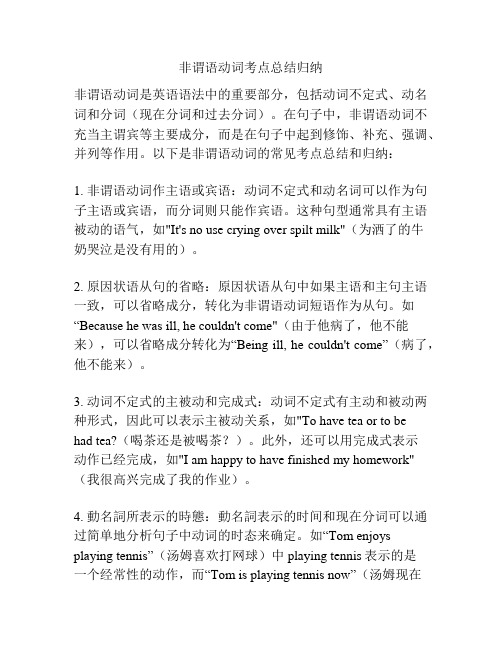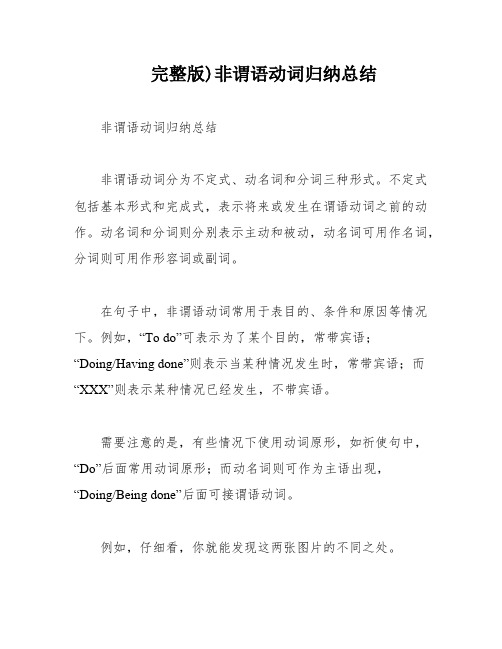非谓语动词归纳总结
非谓语动词归纳

非谓语动词归纳1. want to do sth2. like(love, dislike, hate) to do/doing sth3. enjoy doing sth4. be good at doing sth5. have fun doing sth6. have a good time doing sth7. have some problems doing sth 8. thank sb for doing sth9. agree to do sth 10. try/do one’s best to do sth11. be afraid of doing sth 12. be afraid to do sth13. finish doing sth 14. help sb do/to do sth15. used to do sth 16. be/get used to doing sth17. hear/see/watch/find/notice sb do/doing sth 18. make sb do sth19. be heard/seen/watched/found/noticed to do /doing sth 20. be made to do sth21. mind doing sth 22.mind sb/one’s doing sth23. ask sb to do sth 24. forget to do/ doing sth25. sb. needs to do sth 26. sth needs doing/ to be done27. want sb to do sth 28. would like to do sth29. would like sb to do sth 30. imagine (sb) doing sth31. use sth to do sth 32. remember to do sth/ doing sth33. spend some time (in) doing sth 34. It takes sb some time to do sth35. give up doing sth 36. plan to do sth37. learn to do sth 38. be surprised/ amazed to do sth39. suggest (not) doing sth 40. prefer doing sth to doing sth41. make it +adj. for sb to do sth 42. have difficulty doing sth43. remind sb to do sth 44. try to do /doing sth45. decide to/not to do sth 46. what about doing sth47. be happy to do sth 48. require sb to do sth49. Shall we do sth? 50. keep doing sth51. keep on doing sth 52. keep sb doing sth53. seem to do sth 54. advise sb to do sth55. stop to/ doing sth 56. wish to do sth57. wish sb to do sth 58. hope to do sth59. offer to do sth 60. happen to do sth61. fail to do sth 62. choose to do sth63. be busy doing sth 64. ask sb to do sth65. tell sb to do sth 66. teach sb to do sth67. have sb do sth 68. have sth done69. let sb do sth 70. while(when) doing sth71. expect to do sth 72. expect sb to do sth73. start to do/ doing sth 74. begin to do/ doing sth75. be sure to do sth 76. allow sb to do sth77. feel like doing sth想要干某事78. would rather do sth than do sth 79. invite sb to do sth 80. volunteer to do sth81. manage to do sth 82. order sb to do sth83. prepare to do sth 84. carry on doing sth=go on doing sth85. continue to do/ doing sth 86. prevent/stop/keep sb from doing sth 87. why not do sth 88. prefer to do sth rather than do sth 89. encourage sb to do sth 90. There is no need to do sth91.be sure to do sth 92. warn sb to do sth93. try to do sth 94. try doing sth95. can’t wait to do sth 96. can’t help doing sth97. look forward to doing sth 98. make a contribution to doing sth 99. devote…to doing sth 100. practise doing sth101. promise to do sth 102. promise sb to do sth103. have no choice but to do sth 104. get ill from doing sth105. dare to do sth 106. be likely to do sth107. insist on doing sth 108. have no courage to do sth109. be worth doing 110. promise to do sth111. Can/Could/Will/Would you please do sth? 112. be busy doing sth113. avoid doing sth 114. miss doing sth115 Will/ Would / Can/ Could you please do/ not do sth?116. risk doing sth。
非谓语动词考点总结归纳

非谓语动词考点总结归纳非谓语动词是英语语法中的重要部分,包括动词不定式、动名词和分词(现在分词和过去分词)。
在句子中,非谓语动词不充当主谓宾等主要成分,而是在句子中起到修饰、补充、强调、并列等作用。
以下是非谓语动词的常见考点总结和归纳:1. 非谓语动词作主语或宾语:动词不定式和动名词可以作为句子主语或宾语,而分词则只能作宾语。
这种句型通常具有主语被动的语气,如"It's no use crying over spilt milk"(为洒了的牛奶哭泣是没有用的)。
2. 原因状语从句的省略:原因状语从句中如果主语和主句主语一致,可以省略成分,转化为非谓语动词短语作为从句。
如“Because he was ill, he couldn't come"(由于他病了,他不能来),可以省略成分转化为“Being ill, he couldn't come”(病了,他不能来)。
3. 动词不定式的主被动和完成式:动词不定式有主动和被动两种形式,因此可以表示主被动关系,如"To have tea or to behad tea?(喝茶还是被喝茶?)。
此外,还可以用完成式表示动作已经完成,如"I am happy to have finished my homework"(我很高兴完成了我的作业)。
4. 動名詞所表示的時態:動名詞表示的时间和现在分词可以通过简单地分析句子中动词的时态来确定。
如“Tom enjoys playing tennis”(汤姆喜欢打网球)中playing tennis表示的是一个经常性的动作,而“Tom is playing tennis now”(汤姆现在正在打网球)中playing tennis则表示现在正在进行的动作。
5. 分词作定语:现在分词和过去分词经常用作定语修饰名词,如shining stars(闪闪发亮的星星)、a book written by Hemmingway(海明威写的一本书)。
完整版)非谓语动词归纳总结

完整版)非谓语动词归纳总结非谓语动词归纳总结非谓语动词分为不定式、动名词和分词三种形式。
不定式包括基本形式和完成式,表示将来或发生在谓语动词之前的动作。
动名词和分词则分别表示主动和被动,动名词可用作名词,分词则可用作形容词或副词。
在句子中,非谓语动词常用于表目的、条件和原因等情况下。
例如,“To do”可表示为了某个目的,常带宾语;“Doing/Having done”则表示当某种情况发生时,常带宾语;而“XXX”则表示某种情况已经发生,不带宾语。
需要注意的是,有些情况下使用动词原形,如祈使句中,“Do”后面常用动词原形;而动名词则可作为主语出现,“Doing/Being done”后面可接谓语动词。
例如,仔细看,你就能发现这两张图片的不同之处。
1.Anyone who was seen carrying bags。
boxes。
or cases was XXX(作定语)2.Steam being produced XXX(作主语补足语)3.We decided to stay at home upon seeing the roads covered with snow and ice。
(作宾语补足语)4.The building that will be completed next month will be used as a XXX(作定语)5.The problem being discussed now is not the one that was XXX(作定语)6.XXX(作宾语补足语)7.XXX the air quality in Beijing。
(作目的状语)8.Don't keep the water running when you XXX(作宾语补足语)固定搭配:1.跟不定式作宾语的动词:Aim。
appear。
agree。
arrange。
decide。
choose。
非谓语动词的用法总结

非谓语动词的用法总结动词不定式(一) 时态1. 一般式动词不定式的一般式表示与谓语动词同时或之后的行为。
如: I want to have a restI plan to attend the meeting 2. 完成式不定式的完成式表示不定式的动作发生在谓语动词所表示的动作之前的行为。
如:I ’m sorry to have kept you waiting. 3进展式不定式的动作假如同谓语动词所表示的动作同时发生那么使用不定式的进展式。
如: They seemed to be talking about something important. 4. 完成进展式不定式的完成进展式表示在谓语动词之前已经发生,并且一直进展着的动作。
如: He is said to have been working in that factory for twelve years. 〔二〕动词不定式用法:1. 作主语To master English gives us much help in the study of science 2. 作宾语I want to leave here soon. He pretended to be a doctor. 3. 作表语The most important thing is to study hard. 4. 作宾语补足语不定式作定语必须放在被修饰的名词或代词的后面。
I have no time to talk with her. 6. 作状语不定式作状语时可以表示目的、原因、结果或条件。
I came here to learn from you ( 目的) I ’m very glad to heard the news。
〔原因〕 He is old enough to go to school.(结果) To look at him ,you can’t help laughing.Notes:7. 不定式的复合构造。
非谓语动词讲解归纳

非谓语动词讲解归纳非谓语动词是指在句子中充当谓语的动词形式,不具备人称和数的变化,也不与主语保持一致。
常见的非谓语动词有动词不定式、动名词和分词。
下面我将对这三种非谓语动词进行讲解和归纳。
1. 动词不定式:动词不定式是动词的一种非谓语形式,一般由“to + 动词原形”构成,例如:"to read","to eat"。
动词不定式的用法:a. 作主语:To travel is my dream.(旅行是我的梦想)b. 作宾语:I want to eat an apple.(我想吃一个苹果)c. 作补语:Her dream is to become a doctor.(她的梦想是成为一名医生)d. 作定语:We need someone to help us.(我们需要有人帮助我们)2. 动名词:动名词是将动词变为名词的一种形式,一般以-ing结尾,例如:"reading","writing"。
动名词的用法:a. 作主语:Reading is my hobby.(读书是我的爱好)b. 作宾语:I enjoy swimming in the summer.(我喜欢夏天游泳)c. 作定语:I have a writing notebook.(我有一个写作笔记本)d. 作表语:Her favorite activity is dancing.(她最喜欢的活动是跳舞)3. 分词:分词是动词的一种非谓语形式,一般以-ing或-ed结尾,分别称为现在分词和过去分词,例如:"running","cooked"。
分词的用法:a. 现在分词作定语:The running water is very clean.(流动的水很干净)b. 过去分词作定语:The cooked chicken smells delicious.(煮熟的鸡肉闻起来很香)c. 分词作伴随状语:Hearing the news, she smiled happily.(听到消息,她高兴地笑了)需要注意的是,非谓语动词的形式可以有时态和语态的变化,如不定式可以有完成和进行的形式,动名词可以有进行和完成的形式,分词可以有进行、完成和被动的形式。
非谓语动词考点归纳

非谓语动词考点归纳一、考点归纳非谓语动词是整个高中阶段的重点语法项目,也是高考的必考点,出题形式主要体现在语法填空与写作上。
非谓语动词的主要考点有:考点一:不定式和动名词作主语1. 不定式表示具体或者一次性的动作,而动名词表示一般或习惯的概念。
2. 在写作中,动词不定式和动名词作主语常用it作形式主语,把作真正主语的不定式和动名词短语移到句末,以使句子平衡。
考点二:不定式、动名词和分词作表语1. 动词不定式作表语表示具体或即将发生的动作,而动名词表示习惯动作或者一般概念,或说明主语的内容。
2. 现在分词与过去分词在句中作表语其实就相当于形容词作表语。
现在分词常译为“令人……的”,一般形容事物;过去分词译为“感到……的”多用来形容人。
常见的动词有interest,excite,thrill,frighten,surprise,shock,confuse,puzzle,please,bore等。
考点三:不定式和动名词作宾语1. 后面只能接动名词作宾语的动词主要有:finish,avoid,suggest,consider,appreciate,admit,delay 等。
2. 只能接动词不定式作宾语的动词主要有:refuse,demand,agree,manage,decide,fail,intend,dare,offer,pretend,promise,expect等。
3. 既可接动名词又可接动词不定式(意思不同)的动词主要有:stop,go on,regret,remember,forget,try,mean等。
4. 接动名词表示被动意义的动词主要有意为“需要”的require,want和need等。
考点四:不定式和分词作宾语补足语1. 接动词不定式作宾语补足语的动词主要有:tell,ask,expect,inspire,encourage,allow,remind,persuade,require,force,forbid等。
英语语法非谓语动词归纳总结

英语语法非谓语动词归纳总结一、单项选择非谓语动词1.The rainforest is an amazing place, ________ with plants and animals that aren’t found anywhere else in the world.A.filling B.filledC.being filled D.to fill【答案】B【解析】考查非谓语动词。
句意:热带雨林是一个令人惊讶的地方,充满了世界其他地方不能找到的动植物。
固定词组:be filled with被……充满,此处place和fill之间是一种被动关系,所以用过去分词做伴随状态,故选B。
2.In Australia, many road signs are now both in English and Chinese, ______ it easier for Chinese tourists to travel.A.making B.made C.make D.makes【答案】A【解析】考查状语从句。
在澳大利亚,许多路标都是用英文和中文同时标识,使中国游客去旅游更加容易。
根据与前面一句用逗号隔开,没有连词,故判断此空用非谓语动词,根据与主语是主动关系,故用动词-ing形式,用来修饰和补充上一句话,故选A。
3.________ terrible, the medicine was thrown away by the child.A.Tasted B.TastingC.To taste D.Being tasted【答案】B【解析】【详解】考查非谓语动词。
句意:这种药尝起来非常难吃,被这个孩子扔掉了。
主语是medicine,taste与主语是主动关系,而且taste是系动词无被动,因此用现在分词,故选B。
4.The lecture, _______at 7:00 pm last night, was followed by an observation of the moon with telescopes.A.starting B.being startedC.to start D.to be started【答案】A【解析】选A start与逻辑主语the lecture之间为主动关系,故排除B、D两项。
非谓语动词知识点总结

非谓语动词知识点总结非谓语动词知识点总结非谓语动词,又叫非限定动词,非谓语动词是指在句子中不是谓语的动词,接下来是小编为您整理的非谓语动词知识点总结,希望对您有所帮助。
I.概述1.基本形式的变化:不定式:时态主动态被动态一般式to doto be done进行式to be doing完成式to have builtto have been builtJohn said that he had run in order to catch the bus. (一般式的主动态)He hated to be misunderstood by others. (一般式的被动态) He pretended to be listening attentively. (进行式)He intended to have told you that. (完成式主动态)This work of art seemed to have been created several centuries ago. (完成式的被动态)v-ing形式时态主动态被动态一般式doingbeing done完成式having donehaving been done注意:不及物动词没有被动式动名词I am sure of his coming in time. (一般式主动态) (= I am sure that he will come in time)He is proud of being selected as monitor. (一般式被动态) (= He is proud that he is selected as monitor.)I’m confident of his having passed the exam. (完成式主动态) (= I am confident that he have passed the exam.)He complained of having been cheated by others. (完成式被动态)现在分词He sat in a chair,reading a novel. (一般式主动态)Being exhausted by work, he fell asleep quickly. (一般式被动态)Having finished his homework, he went playing. (完成式主动态)All this having been settled, he went home. (完成式被动态)2.所做成分项目/成分主语表语宾语宾补定语状语动词的ing形式现在分词△ △△△动名词△△△ △不定式△△△△△△过去分词△ △△△注:现在分词、不定式、过去分词都可以作独立成分。
- 1、下载文档前请自行甄别文档内容的完整性,平台不提供额外的编辑、内容补充、找答案等附加服务。
- 2、"仅部分预览"的文档,不可在线预览部分如存在完整性等问题,可反馈申请退款(可完整预览的文档不适用该条件!)。
- 3、如文档侵犯您的权益,请联系客服反馈,我们会尽快为您处理(人工客服工作时间:9:00-18:30)。
非谓语动词归纳总结
二,非谓语动词的运用及考题形式
形式1,
(If/Unless/When/Though/As)( )----------------------,句子(主语+谓语+宾语-----)
(1)To do-----表目的(为了),发生谓语动词后,后面常带宾语
(2)Doing/Having done----(当---时,如果,虽然,因为),后面常带宾语
(3)Done/Having been done----(当---时,如果,虽然,因为),后面不带宾〖注意〗:
1,(Do )---------------, and/but/or/if/when/before/after+主语+谓语+-------- 这是祈使句,所以用动词原
2,(Doing/Being done)------------------is/was(谓语动词)
-----------------------------------.
这是用动名词作主语
〖例证〗:
1,______(look)carefully,and you can find the differences between the two pictures.
2,______(look)after his aged mother, he gave up the chance to go abroad for further study.
3,_______(look) after yourself well is important when you are alone abroad.
4,_______(look) after well by the nurse, the old man recovered quite quickly.
5,_______(look) after well is a kind of love that our parents gave us.
6,_______(look) for the book for a long time, he finally bought it in a bookstore occasionally.
7,_______(look) after well by the nurse for two months,the old man finally recovered.
形式2
主语+谓语+宾语+------,()+------------
1,doing(及物动词后面跟宾语)表示伴随,结果,方式
2,done(及物动词后面不跟宾语)表示伴随,结果,方式
3,only to do表示结果
〖例证〗
1,A hearty laughter releases physical tension, ( )(leave) our muscle relaxed for half an hour. 2,The old grandma got off the bus, ()(support)by her granddaughter.
3,We hurried to the railway station, only( )(find) the train had already left.
4,He got up,washed his faces,had his breakfast, and( )(go) to work.
形式3
主语()+ 谓语+ 宾语()+-------------
1,to do将要做的to be done将被做的(作定语或宾语补足语)
2,doing正在做的being done正在被---的(作定语或宾语补足语)
3,done被----了的(作定语或宾语补足语)
〖例证〗
1,Anyone________(see)________(carry)bags,boxes,cases was stopped by the police.(作定语)2,Steam can be seen__________(rise) when water is heated.(作主语补足语)
3,Seeing the roads _____(cover) with snow and ice, we decided to stay at home.(作宾语补足语)4,The building _________(complete) next month will be used as a laboratory.(作定语)
5,The problem______(discuss) now is not the one _____(discuss)at yesterday’s meeting (作定语)6,He spoke loudly enough to make himself __________(hear) clearly.(作宾语补足语)
7,The government has taken effective measures________(improve) the air condition in Beijing.(作目的状语)
8,Don’t keep the water ________(run) when you brush teeth.(作宾语补足语)
三,固定搭配
1,跟不定式作宾语的动词
Aim,appear,agree,arrange,decide,choose,demand,desire,determine,expect,hope,fail,happen, hesitate,learn,mean,manage,offer,plan,prepare,pretend,promise,refuse,attempt,want
2,跟动名词作宾语的动词
Consider,suggest,advise,excuse,pardon,admit,delay,put
off,fancy,avoid,miss,keep,practice,deny,finish,enjoy,appreciate,
can’t help,forbid,imagine,risk,mind,allow,permit,escape
3,to后面跟动名词的短语
Be/get used to,be related to,be addicted to,be opposed to,be devoted to,be adjusted to,
be connected to,be compared to,lead to,object to,look forward to,stick to,
pay attention to,contribute to,make contributions to,reply to,turn to,belong to,respond to。
